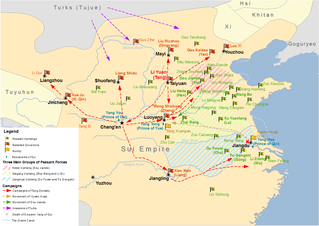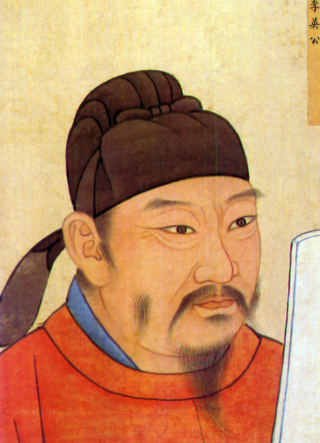Xu Li may refer to:
Xu Li may refer to:

Jia Xu, courtesy name Wenhe, was an official of the state of Cao Wei during the early Three Kingdoms period of China. He started his career in the late Eastern Han dynasty as a minor official. In 189, when the warlord Dong Zhuo took control of the Han central government, he assigned Jia Xu to the unit led by Niu Fu, his son-in-law. In May 192, after Dong Zhuo was assassinated by Lü Bu, Jia Xu advised Li Jue, Guo Si and Dong Zhuo's loyalists to fight back and seize control of the imperial capital, Chang'an, from a new central government headed by Lü Bu and Wang Yun. After Li Jue and the others defeated Lü Bu and occupied Chang'an, Jia Xu served under the central government led by them. During this time, he ensured the safety of the figurehead Han emperor, Emperor Xian, who was being held hostage by Li Jue. He also attempted to prevent internal conflict between Li Jue and Guo Si, but with limited success. After Emperor Xian escaped from Chang'an, Jia Xu left Li Jue and briefly joined the general Duan Wei before becoming a strategist of the warlord Zhang Xiu. While serving under Zhang Xiu, he advised his lord on how to counter invasions by the warlord Cao Cao, who had received Emperor Xian in 196 and taken control of the central government. In 200, during the Battle of Guandu between Cao Cao and his rival Yuan Shao, Jia Xu urged Zhang Xiu to reject Yuan Shao's offer to form an alliance and instead surrender to Cao Cao. Zhang Xiu heeded his advice. Jia Xu then became one of Cao Cao's strategists.
Xu Jinglei is a Chinese actress and film director. She is known as one of the Four Dan Actresses in China.

Romance of the Three Kingdoms is a Chinese television series adapted from the classical 14th century novel of the same title by Luo Guanzhong. The series was produced by China Central Television (CCTV) and was first aired on the network in 1994. It spanned a total of 84 episodes, each approximately 45 minutes long. One of the most expensive television series produced at the time, the project cost 170 million yuan. It was completed over four years and involved over 400,000 cast and crew members, including divisions of the People's Liberation Army from the Beijing, Nanjing and Chengdu military regions. Some of the dialogue spoken by characters was adapted directly from the novel. Extensive battle scenes, such as the battles of Guandu, Red Cliffs and Xiaoting, were also live-acted.

Li Jing, originally Xu Jingtong (徐景通), briefly Xu Jing (徐璟) in 937–939, courtesy name Boyu (伯玉), also known by his temple name as the Emperor Yuanzong of Southern Tang (南唐元宗), also known in historiography as the Middle Lord of Southern Tang (南唐中主), was the second and penultimate monarch of China's Southern Tang dynasty during the Five Dynasties and Ten Kingdoms period. He reigned his state from 943 until his death.
Li Bian, courtesy name Zhenglun, known as Xu Gao between 937 and 939 and Xu Zhigao before 937, and possibly Li Pengnu during his childhood, also known by his temple name as the Emperor Liezu of Southern Tang, was the founder and first emperor of the Chinese Southern Tang dynasty. In traditional histories, he is also often referred to as the First Lord of Southern Tang (南唐先主). He was an adopted son and successor of the Yang Wu regent Xu Wen who usurped power from the Yang Wu emperor Yang Pu.

Li Mi, courtesy name Xuansui (玄邃), pseudonym Liu Zhiyuan (劉智遠), was a Chinese military general, monarch, poet, politician, and rebel. He was the leader of a rebel movement against the rule of the Chinese Sui dynasty. He initially was the strategist of the Sui general Yang Xuangan, who rebelled against Emperor Yang of Sui in 613 but failed. In 617, Li subsequently led a rebellion against Emperor Yang in his own right and killed Zhai Rang, seizing Zhai's troops.

Lingnan is a geographic area referring to the lands in the south of the Nanling Mountains. The region covers the modern Chinese subdivisions of Guangdong, Guangxi, Hainan, Hong Kong & Macau and Northern Vietnam.

Li Shiji, courtesy name Maogong, posthumously known as Duke Zhenwu of Ying, was a Chinese military general and politician who lived in the early Tang dynasty. His original family name was Xú, but he was later given the family name of the Tang imperial clan, Li, by Emperor Gaozu, the Tang dynasty's founding emperor. Later, during the reign of Emperor Gaozong, Li Shiji was known as Li Ji to avoid naming taboo because the personal name of Emperor Gaozong's predecessor, Emperor Taizong, had the same Chinese character "Shi". Li Shiji is also referred to as Xu Maogong and Xu Ji in the historical novels Shuo Tang and Sui Tang Yanyi.

Three Kingdoms is a 2010 Chinese television series based on the events in the late Eastern Han dynasty and the Three Kingdoms period. The plot is adapted from the 14th century historical novel Romance of the Three Kingdoms and other stories about the Three Kingdoms period. Directed by Gao Xixi, the series had a budget of over 160 million RMB and took five years of pre-production work. Shooting of the series commenced in October 2008, and it was released in China in May 2010.

Xu Qiliang is a former air force general in the People's Liberation Army Air Force (PLAAF) of the People's Republic of China. He served as a Vice Chairman of the Central Military Commission of the People's Republic of China from 2013 to 2023, and served as a Vice Chairman of the Central Military Commission of the Chinese Communist Party from 2012 to 2022. He served as a member of the 18th and the 19th Politburo of the Chinese Communist Party. He was promoted from Commander of the PLAAF from 2007 to 2012.
Xu Jing may refer to:
Yang Longyan (楊隆演), né Yang Ying (楊瀛), also known as Yang Wei (楊渭), courtesy name Hongyuan (鴻源), also known by his temple name as the Emperor Gaozu of Yang Wu (楊吳高祖), was a monarch of the Yang Wu dynasty of China during the Five Dynasties and Ten Kingdoms period, reigning initially as the Commandery Prince of Hongnong and later as the Prince of Wu. Throughout his reign, the governance of the Yang Wu state was under the effective control of the regent Xu Wen.
Yíng is an ancient Chinese surname. It was the noble house name of the Qin state during the Eastern Zhou dynasty, and the royal name of the subsequent Qin dynasty. Yíng Zheng was the first emperor of the unified Chinese empire.

The Left Ear is a 2015 Chinese coming of age film directed by Alec Su. It is Su's directorial debut, and based upon the novel of the same name by Rao Xueman. Rao also wrote the film's screenplay. Filming completed and went into post production in November 2014, and was slated for release on April 30, 2015 but was moved forward to April 24, 2015.

Someone Like You is a 2015 Taiwanese romantic-comedy melodrama television series produced by Sanlih E-Television, starring Kingone Wang and Lorene Ren with Sean Lee, Nita Lei and William Liao of Lollipop F. The original title literally translates to "Hearing Happiness". Filming began on December 21, 2014 and finished on May 19, 2015. The drama was filmed as it aired. First original broadcast began January 11, 2015 on TTV channel airing on Sunday nights from 10:00-11:30 pm. Final episode aired on May 24, 2015 with 20 episodes total.

Xu is a Chinese surname. In the Wade-Giles system of romanization, it is romanized as Hsu, which is commonly used in Taiwan.

Artoviridae is a family of negative-strand RNA viruses in the order Mononegavirales. Barnacles, copepods, odonates, parasitoid wasps, pile worms, and woodlice serve as natural hosts. The group name derives from arthropod the phylum of its hosts. Members of the family were initially discovered by high throughput sequencing.
Shu is a Chinese surname. It is 43rd in the Hundred Family Surnames, contained in the verse 熊紀舒屈. Šumuru sinicized their clan name to the Chinese surnames Shu (舒), Xu (徐) or Xiao (蕭) after the demise of the Qing dynasty.
The China men's national artistic gymnastics team represents China in FIG international competitions.